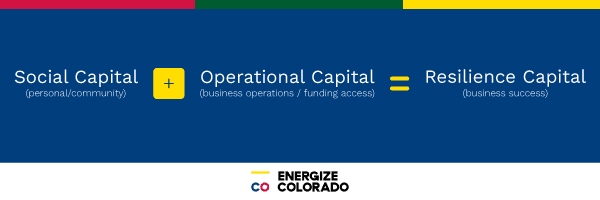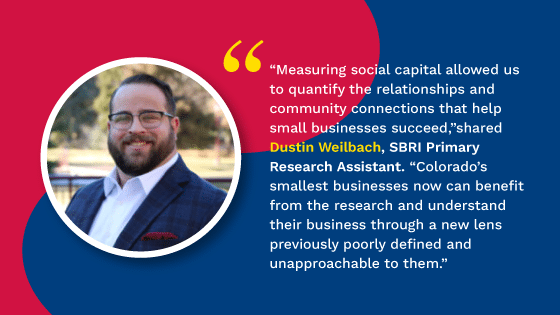In a recent article, we shared the story of how the Small Business Resiliency Index (SBRI) was created by a dedicated group of volunteers from Energize Colorado to assess the current state of resiliency, both social and operational, for our small businesses.
Now, we are taking a deeper look into the survey and its findings. The survey was sent to approximately 14,000 small business owners from Energize Colorado’s database to understand the current state and potential predictors of small business resilience. Approximately 750 businesses responded. Each business that completed the survey a “Resiliency Score” and resources that could leverage to improve their score.
Which factors contribute most to business resiliency?
When the pandemic hit, small business owners activated their fight or flight mode – focusing on survival. Some businesses survived, and many didn’t. Looking beyond the more traditional markers of business success, we wanted to determine factors that differentiated the businesses that survived and see whether these factors could be applied to technical assistance and capital (grants and loans) programs to strengthen Colorado’s small business ecosystem.
At Energize Colorado, we developed the SBRI and determined two main categories of resiliency: Social Capital and Operational Capital.

What is Social Capital?
Measures of Social Capital aim to understand the cultural environment in which small business owners operate. Think of social capital as the mindset and motivations of small business owners, or the personal connections and links the business owner develops and cultivates in the community they operate. This includes a strong community, internal within the business but also external within the small business ecosystem. By working with a network, sharing ideas, and relying on each other for support, businesses build higher outlook for resiliency. Measuring Social Capital helps us understand the overall socio-cultural wellbeing of the small business ecosystem in Colorado and, more importantly, it helps us identify new opportunities for improving small business resilience.
In order to measure social capital, the survey asked participants to rank whether or not they agreed with statements such as:
- I get constructive feedback about my business from the local community.
- In general, I believe Colorado’s local and state government motives and intentions are good toward business owners like me.
- At the present time, I am enthusiastically pursuing my goals.

What is Operational Capital?
Operational Capital includes the more traditional factors that predict the success of a business, such as access to funding, reliable employees, adaptability, and efficiency driven by technology and processes. These metrics assess the health of the following in a small business context: business networks, operational efficiency, adaptability, turnover, funding access, and employment pool.
In order to measure operational capital the survey asked participants to rank whether or not they agreed with statements such as:
- My company has had higher involuntary employee turnover (termination due to economic hardship) than normal in the last 12 months.
- I am able to implement new technology solutions and programs successfully into my business operations (either myself or with assistance).
- My company would be able to continue to operate if there was another lockdown today.
By combining scores of social and operational capital, businesses are able to determine just how resilient they are to future hardships.
The Findings
It’s not enough to simply identify the markers of resilience. Next, we needed to measure them within our ecosystem. Business owners were compared against other businesses in their industry and revenue category and then received their unique Resiliency Score of average, below average, or above average. Businesses were provided with opportunities to access advisors and resources to maintain or improve their performance based on similar companies in their segment.
Average graded scores on each of the components of the Small Business Resilience Index (SBRI) are presented below on a scale from 0 to 100. Across individual respondents, the lowest total SBRI score received was a 1/100, and the highest composite SBRI score received was an 89/100.
Average SBRI Measures of Social Capital:
- Business/Market Alignment (Technological Literacy) – 68/100
- Community Connectivity (Belonging) – 66/100
- Future Orientation (Hope) – 64/100
- Communications Climate Assessment (Trust) – 51/100
Findings for Social Capital
Findings for Social Capital illustrate that the lowest scores were obtained across the Communications Climate and Trust measure. This suggests that the actions of the state government and policy makers during 2020 greatly impacted small business owners’ trust in state leadership. Additionally, this shows us that communication pathways between government officials and Colorado’s small business owners on policies, procedures, and economic recovery is lacking.
Average SBRI Measures of Operational Capital:
- Employment Pool – 70/100
- Operational Efficiency – 66/100
- Destructive Competition – 60/100
- Turnover – 58/100
- Business Network – 57/100
- Adaptability – 47/100
- Funding Access – 35/100
Findings for Operational Capital
Findings for Operational Capital show that funding access for small businesses during the pandemic was a significant obstacle to overall success during the previous year. Additionally, we found that this directly contributed to the low ratings of adaptability of small businesses. Small businesses are also struggling with turnover of employees and the overall strength of their business networks.
In our next article we will look deeper into the components of social and operational capital that help build resiliency capital.
The Small Business Resilience Index (SBRI) survey seeks to quantifiably measure the small business ecosystem to improve the resilience of small businesses and provide future guidance to small business owners, associations, and governmental leaders in Colorado. Read the first article here.

